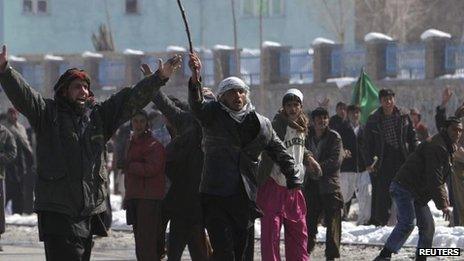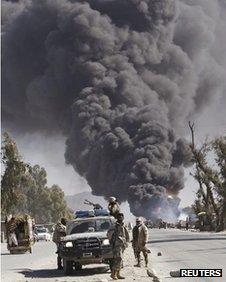Will Afghan Koran row prove Nato's tipping point?
- Published

There is an end of an era feeling in Kabul these days - for what Afghans see as the latest foreign venture in their country.
They have seen off the Russians and the British before and now it is America's time that is drawing to a close, with the British and other Nato allies eager to depart with them.
The revelation that US troops had dumped copies of the Koran into an incineration pit may hasten that end.
At the very least, it has provided an open goal for the Taliban and anyone else who wants to provoke anti-American and anti-foreigner sentiments.
There are few more emotive issues in Afghanistan than allegations of the Islamic holy book being desecrated.
It has triggered violent disturbances as far back as 2005 - even when the claims of the Koran being mishandled have not been substantiated.
'Same mistakes'
Last year, at least 10 people were killed in Mazar-e Sharif after news reached Afghanistan of an extremist American pastor burning a Koran in faraway Florida.

US troop have been accused of deliberately burning Korans
There is quiet fury within the Afghan government towards the Americans at what one official calls their "brainless" behaviour.
They are making the "same mistakes as the Russians" says Afghan analyst Omar Safi - failing to respect the Muslim religion.
"No-one should die because of a few books being set on fire," one Afghan official told me on condition of anonymity.
But "that is no excuse" he said, for American actions.
Even people still well-disposed towards them cannot believe how they could have allowed this to happen, after more than a decade here and many previous mistakes.
Never before have the Americans apologised so quickly and so profusely as this time - but it sounds hollow to many Afghans.
Battle for perceptions
Returning to Afghanistan after several years away, it is striking how much the mood has changed against the US and its allies.
From recent episodes of troops urinating on Taliban bodies to the many instances of civilians being killed over the past 11 years, attitudes towards the Americans have progressively hardened.
There is also widespread frustration at how little has changed, despite the huge quantities of money that have poured in here.
In the main battleground areas of southern and eastern Afghanistan, there are fewer outdoor wedding parties these days - because they have been bombed so many times by US pilots who think they are seeing Taliban gatherings from thousands of feet up.
The US and its Nato allies rightly argue the Taliban kill far more civilians with their suicide and other attacks.
But the Americans are the ones who claim to uphold the highest standards.
What is more, the US doctrine is supposed to be "to protect the population".
So this is how they are judged.
And as has been said so many times in the past, there is no military solution in Afghanistan. It is ultimately a battle for perceptions.
More conspiratorially-minded Afghans find it hard to believe these Korans were burnt by mistake.
US troops must have done it deliberately, some say, to create instability - so they can stay longer.
For the moment though, it is the Americans who are on the defensive - giving the much-criticised government of President Hamid Karzai some relief.
With US-Afghan negotiations over a strategic partnership still bogged down over issues like night-time raids and control of prisoners, Mr Karzai has been quick to seize the advantage - saying the Koran burning disaster would not have happened if the Afghans had been in charge.
The Korans were originally taken from prisoners in US detention, because the Americans apparently believed detainees were using the books to pass messages.
With anti-American demonstrations spreading across the country, what may just have been soldiers obeying a simple order could turn into a tipping point.
- Published23 February 2012
- Published21 February 2012
- Published3 April 2011
- Published8 April 2011
- Published7 September 2010